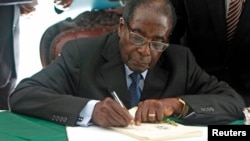HARARE, ZIMBABWE —
Zimbabwe moved a step closer Wednesday to holding new elections, after President Robert Mugabe signed a new constitution into law. The 89-year-old president said Zimbabweans had proved that they can manage their affairs without external assistance or interference.
A police band is singing in Shona saying “Well done. Well done Zimbabwe, you have done it.”
The song seemed fitting Wednesday as four years of protracted debate ended with President Robert Mugabe signing a new constitution into law.
The longtime president, who has been accused of using violence to intimidate opponents, said the constitution paves the way for elections, which must be peaceful.
“ZANU-PF versus MDC. You choose, you vote for the person of your choice. Let us not fight it. Let us do it in a peaceful way. That is what this document of today is telling us. Let us be peaceful,” said Mugabe.
Zimbabwe’s last election in 2008 was marred by violence, with rights groups saying ZANU-PF supporters were beating, torturing, and killing opponents of Mugabe.
As a result, regional leaders forced Mugabe to form a coalition with opposition leader Morgan Tsvangirai, who became prime minister.
Tsvangirai and his MDC party demanded a new constitution be put in place before allowing new elections to end what has been a tense and fragile coalition government.
In the last few months,Mugabe repeatedly has urged Zimbabweans to hold the next polls in peace.
Given his age, some might assume he is preparing for his post-political career, and that even was the tone Wednesday of some of his comments.
“We are all of us still there, but tomorrow we will be of yesterday. Gone. What shall we have left our country? Disunity? Peace?” asked Mugabe.
But the president, who has led Zimbabwe since independence in 1980, is widely expected to seek another term whenever the elections are held.
The new constitution limits presidents to two five-year terms, but is not retroactive, clearing the way for Mugabe possibly to seek 10 more years of rule.
Among other changes, the constitution provides more rights for women, and it increases the power of parliament. The charter makes homosexuality illegal, and it also retains Zimbabwe's death penalty.
A police band is singing in Shona saying “Well done. Well done Zimbabwe, you have done it.”
The song seemed fitting Wednesday as four years of protracted debate ended with President Robert Mugabe signing a new constitution into law.
The longtime president, who has been accused of using violence to intimidate opponents, said the constitution paves the way for elections, which must be peaceful.
“ZANU-PF versus MDC. You choose, you vote for the person of your choice. Let us not fight it. Let us do it in a peaceful way. That is what this document of today is telling us. Let us be peaceful,” said Mugabe.
Zimbabwe’s last election in 2008 was marred by violence, with rights groups saying ZANU-PF supporters were beating, torturing, and killing opponents of Mugabe.
As a result, regional leaders forced Mugabe to form a coalition with opposition leader Morgan Tsvangirai, who became prime minister.
Tsvangirai and his MDC party demanded a new constitution be put in place before allowing new elections to end what has been a tense and fragile coalition government.
In the last few months,Mugabe repeatedly has urged Zimbabweans to hold the next polls in peace.
Given his age, some might assume he is preparing for his post-political career, and that even was the tone Wednesday of some of his comments.
“We are all of us still there, but tomorrow we will be of yesterday. Gone. What shall we have left our country? Disunity? Peace?” asked Mugabe.
But the president, who has led Zimbabwe since independence in 1980, is widely expected to seek another term whenever the elections are held.
The new constitution limits presidents to two five-year terms, but is not retroactive, clearing the way for Mugabe possibly to seek 10 more years of rule.
Among other changes, the constitution provides more rights for women, and it increases the power of parliament. The charter makes homosexuality illegal, and it also retains Zimbabwe's death penalty.




